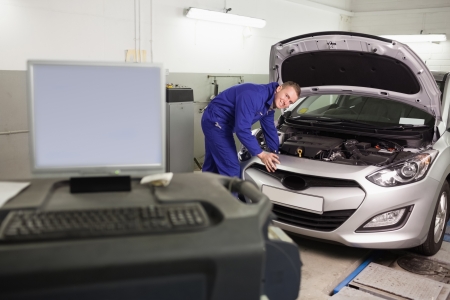Understanding Car Servicing in the UK
Car servicing is a crucial part of vehicle ownership in the UK, ensuring your car remains safe, reliable, and roadworthy. Regular maintenance not only helps prevent unexpected breakdowns but also supports compliance with legal requirements and can protect your vehicle’s resale value. In the UK, a typical car service includes a variety of checks and replacements designed to keep your car running smoothly. Understanding what’s involved in a standard service will help you plan ahead and avoid unnecessary expenses.
| Service Element | Description |
|---|---|
| Oil and Filter Change | Replacing engine oil and filter to ensure proper engine lubrication. |
| Brake Checks | Inspection of brake pads, discs, and fluid levels for safety. |
| Fluid Levels | Topping up or replacing coolant, brake fluid, screen wash, and power steering fluid. |
| Tyre Inspection | Checking tread depth, pressure, and condition for legal compliance and safety. |
| Lights & Electrics | Testing headlights, indicators, battery, and electrical systems. |
| General Vehicle Health Check | Inspecting suspension, exhaust system, belts, and hoses for wear or damage. |
Regular servicing ensures your car meets MOT standards and minimises the risk of expensive repairs down the line. By keeping up with scheduled maintenance, drivers in the UK can enjoy greater peace of mind on the road while potentially lowering long-term running costs.
2. Manufacturer Recommendations and Service Schedules
When it comes to car maintenance in the UK, following your vehicle manufacturer’s recommended service schedule is crucial for both safety and financial reasons. Most car makers provide a detailed service booklet or digital log with your car, outlining exactly how often servicing should occur. These intervals are usually based on either time (annual servicing) or mileage (mileage-based servicing), depending on which comes first.
Annual vs Mileage-Based Intervals
Typically, manufacturers suggest one of two main types of service intervals:
| Service Type | Description | Common UK Recommendation |
|---|---|---|
| Annual Service | A full check-up once a year, regardless of mileage | Every 12 months |
| Mileage-Based Service | Servicing triggered by the distance you drive | Every 10,000–15,000 miles |
Why Do These Intervals Matter?
Adhering to these schedules ensures that key components like oil, filters, brakes, and fluids are checked or replaced regularly. For newer cars under warranty, sticking to the manufacturer’s recommended intervals is also essential to maintain coverage. Ignoring these guidelines may lead to costly repairs down the line and could even affect your car’s resale value.
Check Your Owner’s Manual
The best way to know what’s right for your specific make and model is to consult your owner’s manual or speak with an authorised dealer. Manufacturers like Ford, Vauxhall, and BMW each have unique schedules tailored to their vehicles’ needs and typical UK driving conditions.
![]()
3. MOT vs. Routine Servicing: What’s the Difference?
Many UK drivers often confuse the annual MOT test with regular car servicing, but these are two distinct processes, each serving a unique purpose in keeping your vehicle safe and roadworthy. Understanding the difference is crucial to ensure compliance with legal requirements and to maintain your car’s value and reliability.
What is an MOT?
The MOT (Ministry of Transport) test is a compulsory annual assessment for vehicles over three years old in the UK. This government-mandated check ensures that your car meets minimum safety and environmental standards as set out by law. It is illegal to drive without a valid MOT certificate (except when driving to a pre-booked MOT appointment), and doing so could invalidate your insurance.
What is Routine Servicing?
Routine servicing, on the other hand, is a series of recommended maintenance tasks carried out at regular intervals—typically every 12 months or after a certain mileage, whichever comes first. Unlike the MOT, servicing is not a legal requirement, but it plays a vital role in maintaining your vehicle’s performance, efficiency, and long-term reliability.
MOT vs. Routine Servicing: Key Differences
| Aspect | MOT Test | Routine Servicing |
|---|---|---|
| Legal Requirement | Yes (annual for cars over 3 years old) | No (manufacturer recommended) |
| Main Purpose | Checks roadworthiness and emissions | Keeps car running efficiently & prevents breakdowns |
| Includes Parts Replacement? | No (inspection only) | Yes (oil, filters, spark plugs etc.) |
| Affects Insurance? | Yes (no MOT can invalidate cover) | No direct impact, but poor maintenance may affect claims |
Why Both Are Essential for UK Drivers
The MOT ensures you meet the minimum legal standards to be on the road. However, passing an MOT doesn’t guarantee your car is in optimal condition—it simply means it’s safe enough according to basic criteria on that day. Regular servicing goes further by preventing major faults, extending your vehicle’s lifespan, improving fuel efficiency, and even maintaining your car’s resale value. For peace of mind and financial protection—much like choosing comprehensive insurance cover—it pays to commit to both an annual MOT and timely servicing.
4. Factors That Influence How Often You Should Service Your Car
When considering how frequently you should service your car in the UK, it’s important to understand that a one-size-fits-all approach simply doesn’t work. Several key factors will influence your ideal servicing schedule. Let’s explore the most significant variables British motorists should keep in mind:
Driving Habits
Your driving style and routine are crucial. Frequent short journeys—common in urban areas like London or Manchester—can be harsher on your engine than long motorway drives, as the engine rarely reaches optimal operating temperature. Aggressive acceleration and braking also increase wear and tear, requiring more frequent checks.
Car Age and Model
Older vehicles or those with high mileage generally need servicing more often. Newer models may have advanced diagnostics and longer service intervals but always check your manufacturer’s guidelines. Certain makes and models, especially premium or performance cars, may have unique requirements.
UK Weather Conditions
The British climate is famously unpredictable, with rain, frost, and even occasional snow. These conditions can cause rust, battery issues, and tyre wear. Cars regularly exposed to harsh weather may benefit from interim services between full annual checks.
Key Factors Affecting Service Frequency
| Factor | Description | Impact on Service Frequency |
|---|---|---|
| Driving Habits | Short trips, heavy traffic, aggressive driving | More frequent servicing recommended |
| Car Age/Model | Older/high mileage vs newer/low mileage cars | Older/high mileage = increased frequency; newer = longer intervals |
| Weather Conditions | Rain, cold snaps, salty roads (winter) | Potential for interim checks to prevent corrosion and mechanical issues |
| Manufacturer Guidelines | As specified in owner’s manual/service book | Follow for warranty & optimal performance |
Expert Tip:
If you’re unsure about your car’s needs, consult a local garage or an independent mechanic familiar with UK roads—they can offer tailored advice based on your specific circumstances.
5. Expert Advice on Maximising Car Value and Safety
UK automotive experts consistently stress the importance of regular car servicing, not only for safety but also for maintaining your vehicle’s value over time. According to professional mechanics and motoring organisations, sticking to a manufacturer’s service schedule is key to keeping your car running smoothly and minimising unexpected repair costs. Here are some expert-backed tips to help you maximise your car’s performance, safety, and resale value:
Maintain a Full Service History
Keeping detailed records of every service can significantly boost your car’s resale value. Potential buyers and dealerships in the UK prefer vehicles with a comprehensive service history, as it demonstrates that the car has been well cared for.
Recommended Service Intervals
| Service Type | Interval (Miles) | Interval (Time) |
|---|---|---|
| Interim Service | Every 6,000 miles | or every 6 months |
| Full Service | Every 12,000 miles | or every 12 months |
| Major Service | Every 24,000 miles | or every 24 months |
Prioritise Safety Checks
Regular servicing includes essential safety checks such as brakes, tyres, lights, and suspension components. Experts highlight that catching minor issues early prevents them from developing into costly or dangerous faults down the line.
The Benefits of Regular Servicing
- Improved fuel efficiency and reduced emissions
- Smoother engine performance and fewer breakdowns
- Longer lifespan for critical components like timing belts and brakes
Select Reputable Garages
The AA and RAC recommend choosing garages approved by the Motor Ombudsman or those that participate in the Good Garage Scheme. These establishments follow industry best practices and use quality parts, ensuring your warranty remains intact and your car receives the highest standard of care.
Expert Tip:
If you use your car for commuting or frequent long journeys across the UK, consider more frequent interim services to keep up with wear and tear. This proactive approach protects both your investment and your peace of mind.
6. Insurance Implications of Skipping or Delaying Servicing
Regular car servicing is not just about safety and performance—it also has a significant impact on your vehicle insurance in the UK. Many drivers are unaware that failing to stick to a recommended service schedule can put their insurance cover at risk. Here’s how lapses in servicing can affect your policy and potential claims, based on common UK insurance practices.
How Service History Affects Insurance Policies
Insurers often require that vehicles are kept in a roadworthy condition as part of their terms and conditions. If you skip or delay services, particularly those outlined by the manufacturer, you could inadvertently breach these terms. This may lead to complications if you need to make a claim after an accident or breakdown.
Common Scenarios Impacting Insurance
| Scenario | Potential Insurance Impact |
|---|---|
| No recent service history | Claim may be reduced or rejected if poor maintenance contributed to the incident. |
| Non-manufacturer approved parts used during overdue service | May invalidate warranty and affect comprehensive cover. |
| MOT passed but routine service skipped | MOT checks legal safety, but missed services might still breach policy requirements. |
| Full service completed regularly | Smooth claims process; maintains compliance with most insurer terms. |
Policy Exclusions and Small Print
Most UK insurers include exclusions related to lack of maintenance. For instance, if your brakes fail due to lack of servicing and this leads to an accident, your insurer could argue negligence and refuse payout. Always review your policy documents for details on required maintenance standards.
Protecting Your Cover: Best Practices
- Stick to your vehicle’s recommended service intervals—annually or by mileage, whichever comes first.
- Keep all receipts and service records as proof for your insurer.
- If using independent garages, ensure they follow manufacturer guidelines and use approved parts.
- Notify your insurer about any major repairs or modifications during servicing.
In summary, regular servicing is essential not only for keeping your car running smoothly but also for ensuring your insurance remains valid. Skipping or delaying routine services can have costly consequences in the event of a claim, so always prioritise timely maintenance as part of responsible car ownership in the UK.

